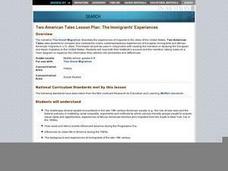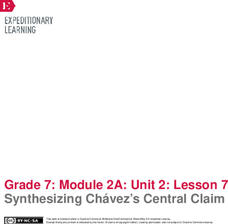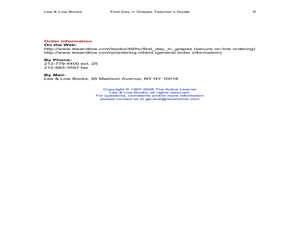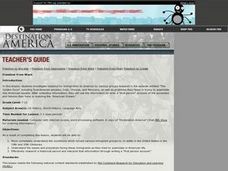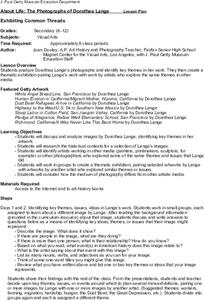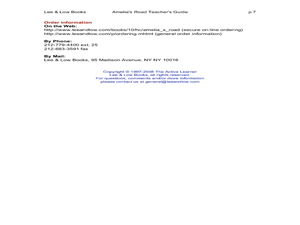Curated OER
The Great Migration: Two American Tales
Students compare and contrast experiences of European immigrants and African American migrants in U.S. cities. After examining the topic, they write essays evaluating the differences and similarities of the groups' experiences.
Constitutional Rights Foundation
Unauthorized Immigration and the US Economy
As part of a study of immigration and the U.S. economy, class members assume the role of newspaper editors to determine which submitted letters to print on their paper's editorial page to present a balanced view of the debate.
Curated OER
Children in the Fields
Fourth graders research Hispanic child labor in California's agricultural period. They create dioramas reflecting the lives of migrant farm workers and political cartoons as produce crate labels, They illustrate farm scenes and hold a...
Curated OER
"Escuela" Debate
Students observe a documentary on "Escuela" to explore the life and education of migrant families. After discussing the related topics in the movie, students share their conclusions migrant farmworkers. Using the Internet and other...
EngageNY
Reading Closely: Introducing Chávez’s Commonwealth Club Address and Considering the Plight of the Farmworker
How can a persuasive speech help inspire social change? Scholars read along as they listen to the first half of César Chávez's 1984 speech, "Commonwealth Club Address." Next, pupils use graphic organizers to analyze one of Chávez's...
EngageNY
Speech Structure: Unions as Agents of Change— Part 2
Scholars continue reading César Chávez's 1984 speech, "Address to the Commonwealth Club of California." Working with partners, they complete graphic organizers to determine a claim that Chávez makes about the UFW.
EngageNY
Mid-Unit Assessment: How Chávez Develops His Claims in the Commonwealth Club Address
Scholars complete a mid-unit 2 assessment, analyzing how César Chávez supports his claims in his 1984 speech, "Address to the Commonwealth Club of California." Learners focus on paragraphs 18 and 19 of the speech, answering text-based...
EngageNY
Synthesizing Chávez’s Central Claim
Class members play an interactive game, matching strips of paper containing rhetorical devices with examples from César Chávez use rhetoric in his 1984 speech, "Address to the Commonwealth Club of California." Next, partners discuss...
EngageNY
End of Unit Assessment: Analyzing the Structure of Chávez’s Wrath of Grapes Speech
César Chávez gave his 1986 "Wrath of Grapes" speech to educate consumers about pesticide use. Scholars complete an end of unit 2 assessment, applying what they learned throughout the unit to a new text. They then analyze the structure of...
Facing History and Ourselves
California Grape Workers’ Strike: 1965–66
The California grape workers' strike of 1965-66 is the focus of a lesson that asks high schoolers to investigate the strategies farmworkers used to organize and gain contracts with grape growers that ensured higher waters and better work...
National Woman's History Museum
Dolores Huerta: The Life and Work of a 20th Century Activist
Extra! Extra! High schoolers read about Dolores Huerta, the social activist who helped organize the United Farm Workers. Researchers read primary and secondary sources about Huerta's work and craft a headline, supported by three pieces...
National Woman's History Museum
Dolores Huerta and the Delano Grape Strike
Few have heard of Dolores Huerta and her part in organizing the California farm workers, establishing the United Farm Workers union and orchestrating the Delano Grape strike. High schoolers consider why this powerful woman has been...
Curated OER
Grapes of Wrath: Setting up Historical Context
Discuss life in the 1930s in relation to the Dust Bowl and Great Depression, then do a cross-media analysis. Here you'll find background information on film maker John Ford, writer John Steinbeck, and 1930s America. You can compare the...
Curated OER
Confucianism in a Changing Society
A great lesson promotes thoughtful discussion, global perspectives, and links between economics and culture. Learners view four clips showing how Confucian teachings have shaped Chinese culture and how filial piety plays a role in...
Curated OER
Fast Food Tomatoes
Here is a fantastic reading passage and discussion question to challenge your advanced learners. They read a passage describing arguments against the mass production of tomatoes for fast food resulting in poor treatment of workers. Then...
Curated OER
First Day in Grapes
Students read about a boy's first day in a new school. In this self-esteem lesson, students discuss the problems Chico has in his new school and how he faces them with courage and bravery. Students discuss people who migrate from other...
Curated OER
Immigration to America
Students examine reasons for immigration to the United States in the 19th century. They role play as immigrants asked to write accounts of their immigrant experiences.
Curated OER
The Photographs of Dorothea Lange
Students examine theme in the photography of Dorothea Lange. In this photography lesson plan, students analyze photography taken by Dorothea Lange and identify themes that run through each. They design an exhibition that shows how the...
Curated OER
Race & White Privilege
Students read and analyze the Tomas Rivera novel "...And the Earth Did Not Devour Him." In small groups they select three paragraphs from the text that are relevant to the issues of racism or white privelege, conduct Internet research,...
Curated OER
Problems Facing Agriculture
Fourth graders examine the conflicts over land ownership and water in the second half of the 1800s in California. They write a criticism about the problems that farmers faced, and work in pairs to define key vocabulary terms.
Curated OER
Amelia's Road: Teacher's Guide
Students complete pre reading, writing, during reading, and interdisciplinary activities for the book Amelia's Road. In this reading lesson plan, students complete journal entries, answer short answer questions, have discussions, and more.
Curated OER
Dust Bowl Exodus: How Drought and the Depression Took Their Toll
Students examine the migration of refugees. In this California history lesson, students listen to their instructor present a lecture regarding the details of how the Dust Bowl and Great Depression led to a California population...
Curated OER
About Life: The Photographs of Dorothea Lange
Students use art to analyze a period in history. For this lesson about the effect of art on history, students study many different pieces of photography by Dorothea Lange. Students will observe photographs from certain time periods and...
Curated OER
The Photographs of Dorothea Lange
Young scholars research social-documentary photography using Dorothea Lange’s documentary projects. In this photography analysis lesson, students analyze examples of photographs by Dorothea Lange and research one or more of Dorothea...


